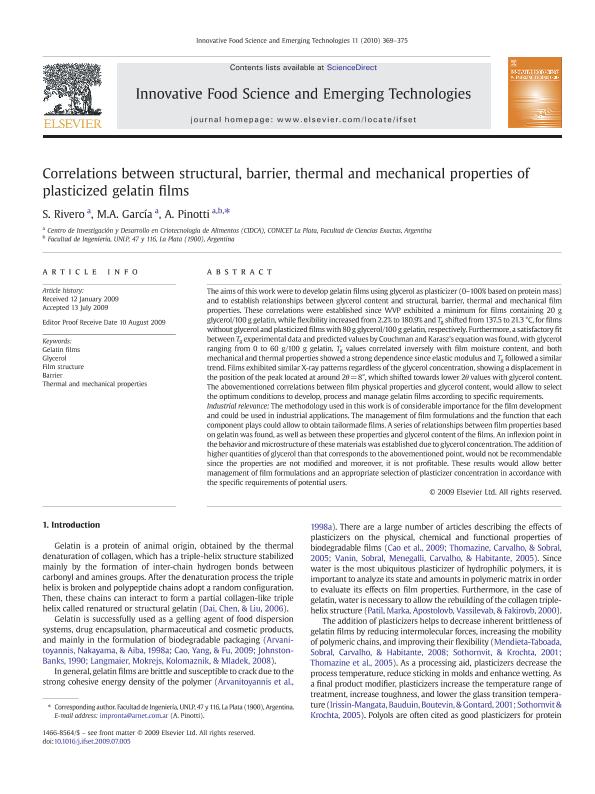Mostrar el registro sencillo del ítem
dc.contributor.author
Rivero, Sandra G. M.

dc.contributor.author
Garcia, Maria Alejandra

dc.contributor.author
Pinotti, Adriana Noemi

dc.date.available
2021-08-09T14:42:06Z
dc.date.issued
2010-04
dc.identifier.citation
Rivero, Sandra G. M.; Garcia, Maria Alejandra; Pinotti, Adriana Noemi; Correlations between structural, barrier, thermal and mechanical properties of plasticized gelatin films; Elsevier; Innovative Food Science & Emerging Technologies; 11; 2; 4-2010; 369-375
dc.identifier.issn
1466-8564
dc.identifier.uri
http://hdl.handle.net/11336/138023
dc.description.abstract
The aims of this work were to develop gelatin films using glycerol as plasticizer (0-100% based on protein mass) and to establish relationships between glycerol content and structural, barrier, thermal and mechanical film properties. These correlations were established since WVP exhibited a minimum for films containing 20 g glycerol/100 g gelatin, while flexibility increased from 2.2% to 180.9% and Tg shifted from 137.5 to 21.3 °C, for films without glycerol and plasticized films with 80 g glycerol/100 g gelatin, respectively. Furthermore, a satisfactory fit between Tg experimental data and predicted values by Couchman and Karasz's equation was found, with glycerol ranging from 0 to 60 g/100 g gelatin. Tg values correlated inversely with film moisture content, and both mechanical and thermal properties showed a strong dependence since elastic modulus and Tg followed a similar trend. Films exhibited similar X-ray patterns regardless of the glycerol concentration, showing a displacement in the position of the peak located at around 2θ = 8°, which shifted towards lower 2θ values with glycerol content. The abovementioned correlations between film physical properties and glycerol content, would allow to select the optimum conditions to develop, process and manage gelatin films according to specific requirements. Industrial relevance: The methodology used in this work is of considerable importance for the film development and could be used in industrial applications. The management of film formulations and the function that each component plays could allow to obtain tailormade films. A series of relationships between film properties based on gelatin was found, as well as between these properties and glycerol content of the films. An inflexion point in the behavior and microstructure of these materials was established due to glycerol concentration. The addition of higher quantities of glycerol than that corresponds to the abovementioned point, would not be recommendable since the properties are not modified and moreover, it is not profitable. These results would allow better management of film formulations and an appropriate selection of plasticizer concentration in accordance with the specific requirements of potential users.
dc.format
application/pdf
dc.language.iso
eng
dc.publisher
Elsevier

dc.rights
info:eu-repo/semantics/openAccess
dc.rights.uri
https://creativecommons.org/licenses/by-nc-sa/2.5/ar/
dc.subject
BARRIER
dc.subject
FILM STRUCTURE
dc.subject
GELATIN FILMS
dc.subject
GLYCEROL
dc.subject
THERMAL AND MECHANICAL PROPERTIES
dc.subject.classification
Alimentos y Bebidas

dc.subject.classification
Otras Ingenierías y Tecnologías

dc.subject.classification
INGENIERÍAS Y TECNOLOGÍAS

dc.title
Correlations between structural, barrier, thermal and mechanical properties of plasticized gelatin films
dc.type
info:eu-repo/semantics/article
dc.type
info:ar-repo/semantics/artículo
dc.type
info:eu-repo/semantics/publishedVersion
dc.date.updated
2021-07-01T15:43:29Z
dc.identifier.eissn
1878-5522
dc.journal.volume
11
dc.journal.number
2
dc.journal.pagination
369-375
dc.journal.pais
Países Bajos

dc.journal.ciudad
Amsterdam
dc.description.fil
Fil: Rivero, Sandra G. M.. Provincia de Buenos Aires. Gobernación. Comisión de Investigaciones Científicas. Centro de Investigación y Desarrollo en Criotecnología de Alimentos. Consejo Nacional de Investigaciones Científicas y Técnicas. Centro Científico Tecnológico Conicet - La Plata. Centro de Investigación y Desarrollo en Criotecnología de Alimentos. Universidad Nacional de La Plata. Facultad de Ciencias Exactas. Centro de Investigación y Desarrollo en Criotecnología de Alimentos; Argentina
dc.description.fil
Fil: Garcia, Maria Alejandra. Provincia de Buenos Aires. Gobernación. Comisión de Investigaciones Científicas. Centro de Investigación y Desarrollo en Criotecnología de Alimentos. Consejo Nacional de Investigaciones Científicas y Técnicas. Centro Científico Tecnológico Conicet - La Plata. Centro de Investigación y Desarrollo en Criotecnología de Alimentos. Universidad Nacional de La Plata. Facultad de Ciencias Exactas. Centro de Investigación y Desarrollo en Criotecnología de Alimentos; Argentina
dc.description.fil
Fil: Pinotti, Adriana Noemi. Provincia de Buenos Aires. Gobernación. Comisión de Investigaciones Científicas. Centro de Investigación y Desarrollo en Criotecnología de Alimentos. Consejo Nacional de Investigaciones Científicas y Técnicas. Centro Científico Tecnológico Conicet - La Plata. Centro de Investigación y Desarrollo en Criotecnología de Alimentos. Universidad Nacional de La Plata. Facultad de Ciencias Exactas. Centro de Investigación y Desarrollo en Criotecnología de Alimentos; Argentina. Universidad Nacional de La Plata. Facultad de Ingeniería; Argentina
dc.journal.title
Innovative Food Science & Emerging Technologies

dc.relation.alternativeid
info:eu-repo/semantics/altIdentifier/url/https://bit.ly/3jAZuqZ
dc.relation.alternativeid
info:eu-repo/semantics/altIdentifier/doi/http://dx.doi.org/10.1016/j.ifset.2009.07.005
Archivos asociados
